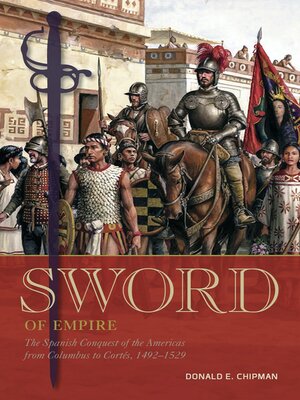Sword of Empire
ebook ∣ The Spanish Conquest of the Americas from Columbus to Cortés, 1492-1529
By Donald E. Chipman

Sign up to save your library
With an OverDrive account, you can save your favorite libraries for at-a-glance information about availability. Find out more about OverDrive accounts.
Find this title in Libby, the library reading app by OverDrive.



Search for a digital library with this title
Title found at these libraries:
| Library Name | Distance |
|---|---|
| Loading... |
Sword of Empire: The Spanish Conquest of the Americas from Columbus to Cortés, 1492–1529 is, by design, an approachable and accessible history of some of the most life-altering events in the story of man. Chipman examines the contributions of Christopher Columbus and Hernando Cortes in creating the foundations of the Spanish Empire in North America.
Chipman has produced a readable and accurate narrative for students and the reading public, although some information presented on Cortes cannot be found elsewhere in print and is therefore of interest to specialists in the history of Spain in America. Exclusive material from Professor France V. Scholes and the author share insights into the multi layered complexities of a man born in 1484 and named at birth Fernando Cortes.
As for Columbus, born in Genoa on the Italian peninsula in 1451 and given the name Cristobal de Colon, he is a more transformative man than Cortes in bringing Western Civilization to the major Caribbean islands in the Spanish West Indies and beyond. Historians strive to present a "usable past" and the post-Columbian world is, of course, the modern world. Columbus's discoveries, those of other mariners who followed to the south in America, and still other eastward to the Asia placed the world on the path of global interdependence-both good and ill-for peoples of the world.
There are no footnotes in Sword of Empire—this is narrative at its finest—but there are extensive bibliographies for each chapter that will prove useful for readers of every background.
Chipman has produced a readable and accurate narrative for students and the reading public, although some information presented on Cortes cannot be found elsewhere in print and is therefore of interest to specialists in the history of Spain in America. Exclusive material from Professor France V. Scholes and the author share insights into the multi layered complexities of a man born in 1484 and named at birth Fernando Cortes.
As for Columbus, born in Genoa on the Italian peninsula in 1451 and given the name Cristobal de Colon, he is a more transformative man than Cortes in bringing Western Civilization to the major Caribbean islands in the Spanish West Indies and beyond. Historians strive to present a "usable past" and the post-Columbian world is, of course, the modern world. Columbus's discoveries, those of other mariners who followed to the south in America, and still other eastward to the Asia placed the world on the path of global interdependence-both good and ill-for peoples of the world.
There are no footnotes in Sword of Empire—this is narrative at its finest—but there are extensive bibliographies for each chapter that will prove useful for readers of every background.







